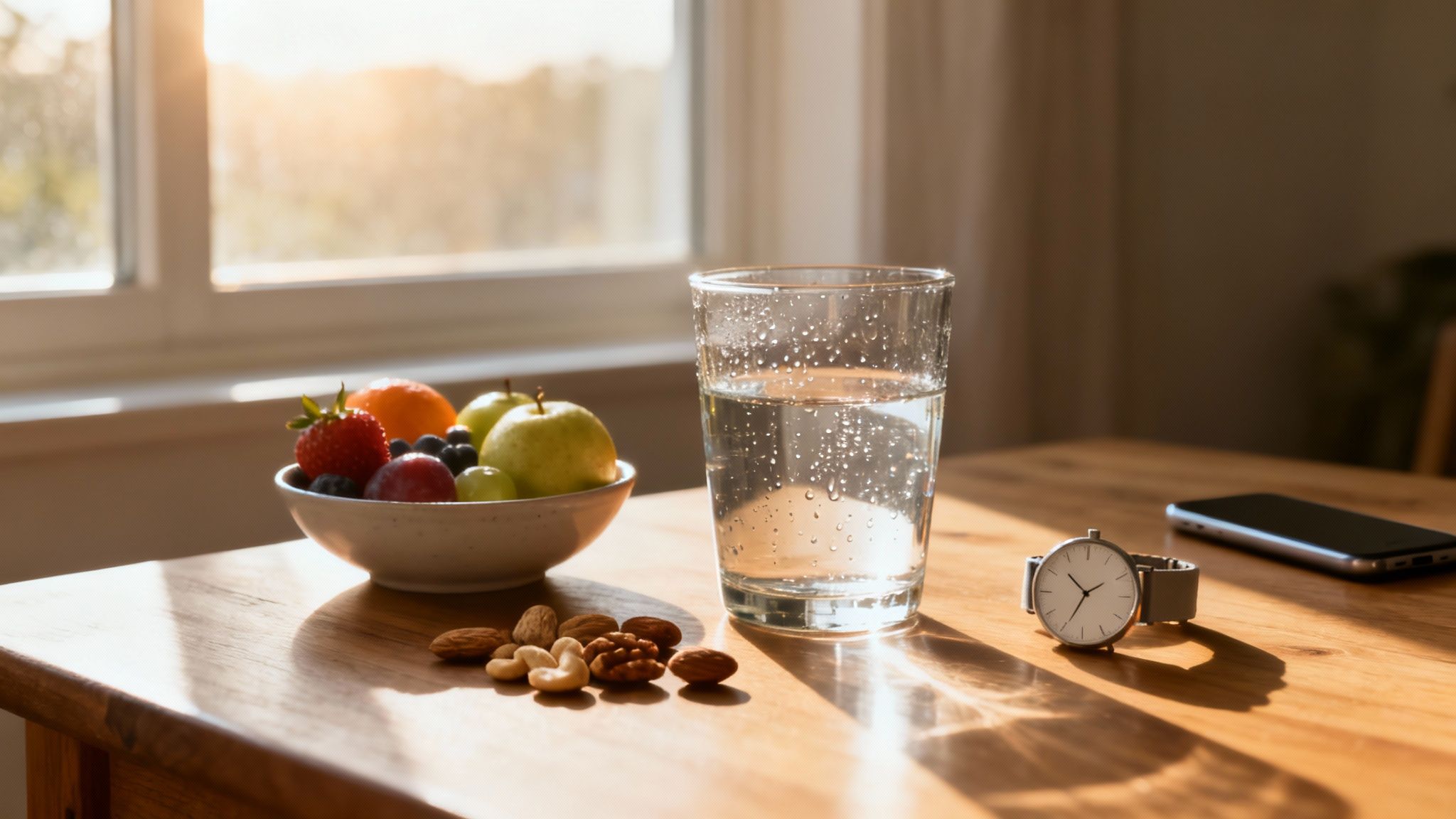
How to Become Sober Faster: A Practical Guide
The hard truth? You can’t actually force your body to sober up faster. The only thing that truly lowers your Blood Alcohol Concentration (BAC) is giving your liver time to do its job. All those common tricks you hear about, like chugging coffee or taking a cold shower, might make you feel more alert, but they don’t make you any less intoxicated.
The Reality of Sobering Up
If you’ve ever searched for how to become sober faster, you’ve probably waded through a sea of myths. People will swear by drinking strong coffee, taking an icy shower, or even hitting the gym to “sweat it out.” But here’s the thing: while these might jolt your senses, they do absolutely nothing to speed up the one process that actually matters—alcohol metabolism.
Your liver is the main player here, and it works at a steady, non-negotiable pace. There’s no rushing it.
Why Common Tricks Fail
It’s incredibly easy to mistake feeling alert for being sober. That caffeine buzz from a strong cup of coffee can mask the sedative effects of alcohol, creating a dangerous false sense of security. You might feel less tired, but your coordination, judgment, and reaction time are still just as impaired. The same goes for a cold shower; the shock might wake you up, but it won’t touch your BAC.
The real problem is that these “cures” only tackle the symptoms, like drowsiness. They don’t address the root cause of intoxication, which is the alcohol still circulating in your bloodstream.
On average, a healthy liver processes about one standard drink per hour. While a lot of popular methods claim to speed this up, the science just isn’t there. The only clinically proven way to get sober is to let your body metabolize the alcohol on its own time. You can find more in-depth information on alcohol’s effects from the World Health Organization.
We’ve all heard the stories and “quick fixes.” Let’s break down some of the most common myths versus what’s actually happening in your body.
Common Sobering Myths vs Reality
| Myth | What It Actually Does | Does It Lower BAC? |
|---|---|---|
| Drinking strong coffee | Acts as a stimulant, making you feel more awake and alert. | No. It can create a “wide-awake drunk” state, but your BAC remains unchanged. |
| Taking a cold shower | Shocks your system, increasing alertness and heart rate temporarily. | No. It has zero effect on how fast your liver metabolizes alcohol. |
| ”Sweating it out” with exercise | A tiny amount of alcohol is excreted through sweat, but it’s negligible. | No. Over 90% of alcohol is processed by the liver. Exercise won’t speed that up. |
| Eating a big meal | Slows the absorption of alcohol into the bloodstream if eaten before or while drinking. | No. Eating after you’re already drunk won’t sober you up any faster. |
As you can see, none of these popular methods actually get the alcohol out of your system. They just make you feel different, which can be dangerously misleading.
This visual really puts into perspective how little impact these methods have compared to just letting time pass.
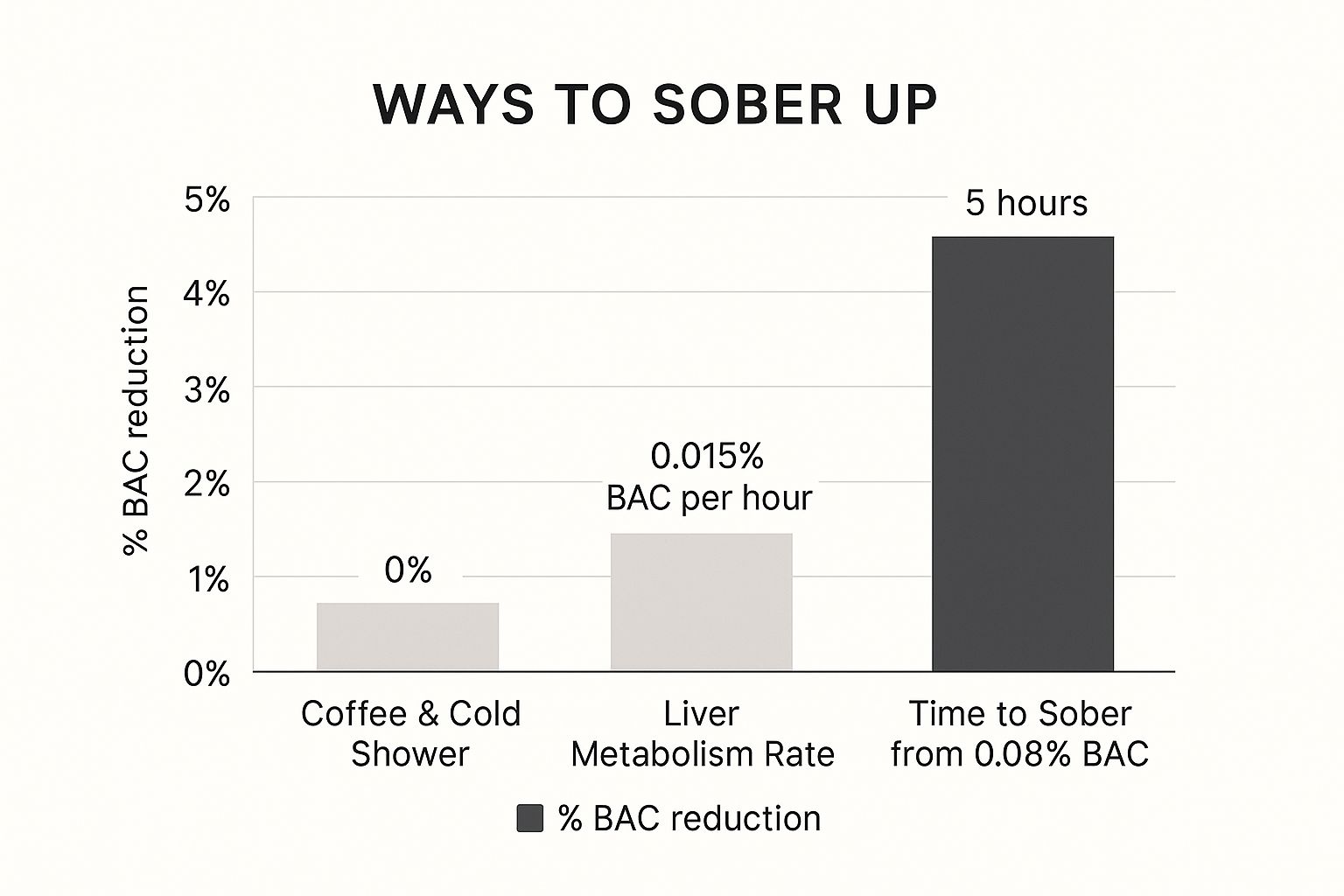
The chart makes it crystal clear: time is the only real factor that lowers your BAC. It reinforces the fact that when it comes to getting sober, there are no shortcuts.
How Your Body Actually Processes Alcohol
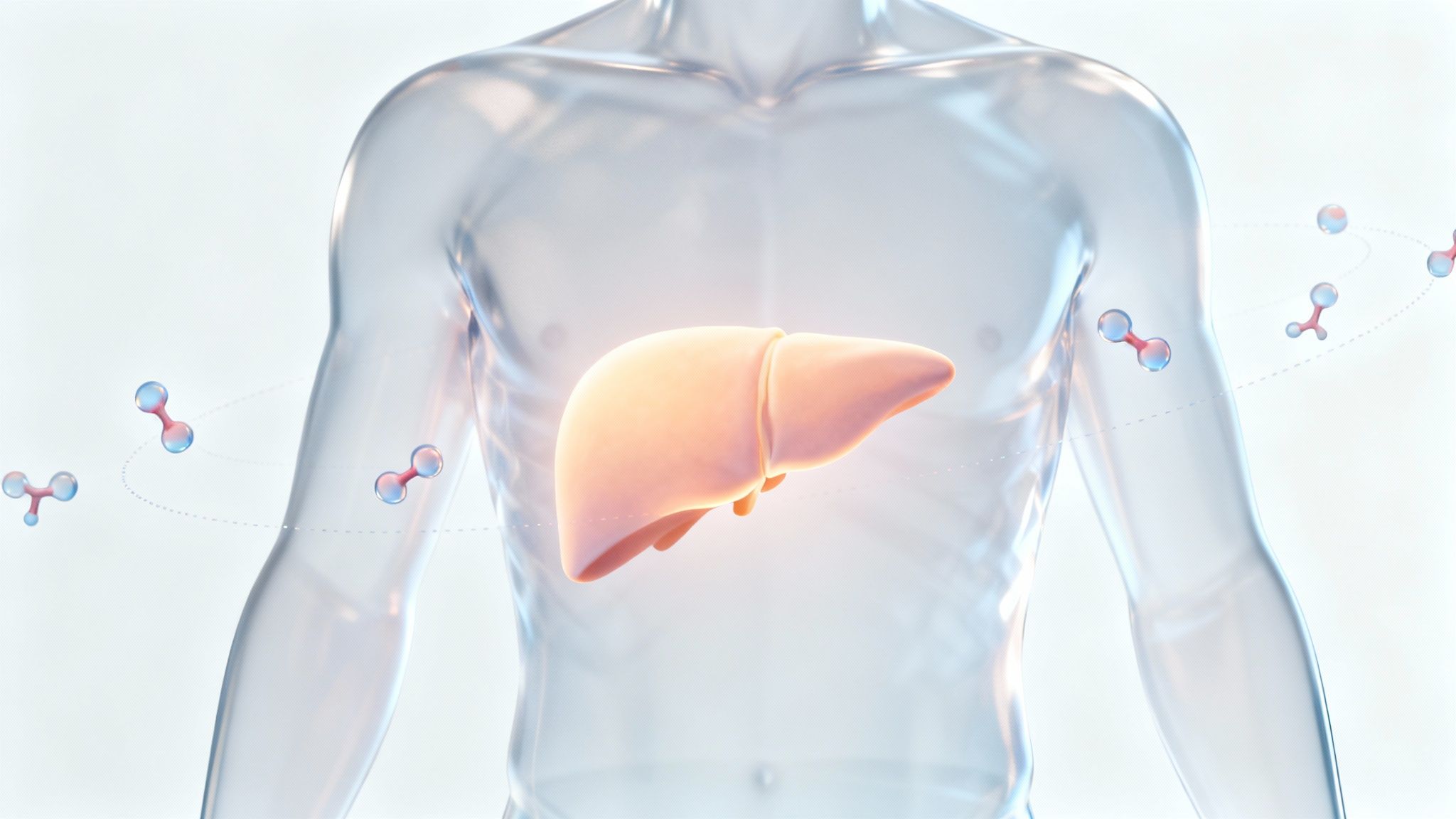
Before we can even talk about sobering up, we need to get real about what’s happening inside your body from the moment you take that first sip. It’s a fascinating biological process, and understanding it is key to realizing why there are no magic shortcuts.
Once you have a drink, alcohol doesn’t just sit in your stomach. It’s absorbed directly into your bloodstream, mainly through your stomach lining and small intestine. This is why you can start feeling the effects in as little as 15 minutes. From there, it hitches a ride through your circulatory system to pretty much every part of your body, including your brain.
Your liver is the star of the show here. Think of it as a dedicated, highly specialized processing plant that works around the clock to break down the alcohol so your body can get rid of it. But here’s the catch: this plant has a fixed assembly line speed.
On average, your liver can only process about one standard drink per hour. If you’re drinking faster than your liver can work, your Blood Alcohol Concentration (BAC) starts to climb. That’s when you feel intoxicated.
The Key Players: Your Liver and Its Enzymes
Your liver tackles alcohol with a one-two punch using a team of special enzymes. First up is alcohol dehydrogenase (ADH), which gets to work converting alcohol into a really nasty, toxic compound called acetaldehyde. Fun fact: this substance is a major culprit behind those killer hangovers.
Thankfully, your body doesn’t leave that toxic stuff hanging around. Another enzyme, aldehyde dehydrogenase (ALDH), swoops in almost immediately to break acetaldehyde down into acetate, which is harmless. Your body then easily turns acetate into water and carbon dioxide, which you simply breathe or pee out.
Here’s the bottom line: This entire process is non-negotiable. Your liver works at its own pace, and there’s nothing you can do to speed up these enzymes. Coffee, cold showers, greasy food—none of it makes a difference. The only thing that truly works is time.
Factors That Change Your Sobering Timeline
Ever noticed how your friend seems completely fine after three beers, while you’re feeling woozy after just one? That’s because everyone’s internal processing plant runs a little differently. Several personal factors dictate your unique timeline for sobering up.
- Gender: It’s a physiological fact—women tend to have less body water than men and lower levels of the ADH enzyme. This means alcohol becomes more concentrated in their system and takes longer to break down.
- Body Weight and Composition: Alcohol dissolves in water, not fat. A person with more muscle and less body fat can handle the same amount of alcohol better than someone of the same weight with a higher fat percentage.
- Genetics: Your DNA plays a huge role in how efficiently your ADH and ALDH enzymes work. This is why alcohol tolerance can vary so dramatically across different people and ethnic backgrounds.
- Food: Drinking on an empty stomach is like opening a fast-track lane for alcohol to hit your bloodstream. Having a meal before or while you drink slows down absorption, giving your liver a fighting chance to keep up.
When you see all these variables laid out, it becomes crystal clear why a one-size-fits-all approach to sobriety is a myth. Getting sober isn’t a race you can win with a few clever tricks; it’s a biological process that demands respect and, most importantly, time.
How to Feel Better While Your Body Recovers
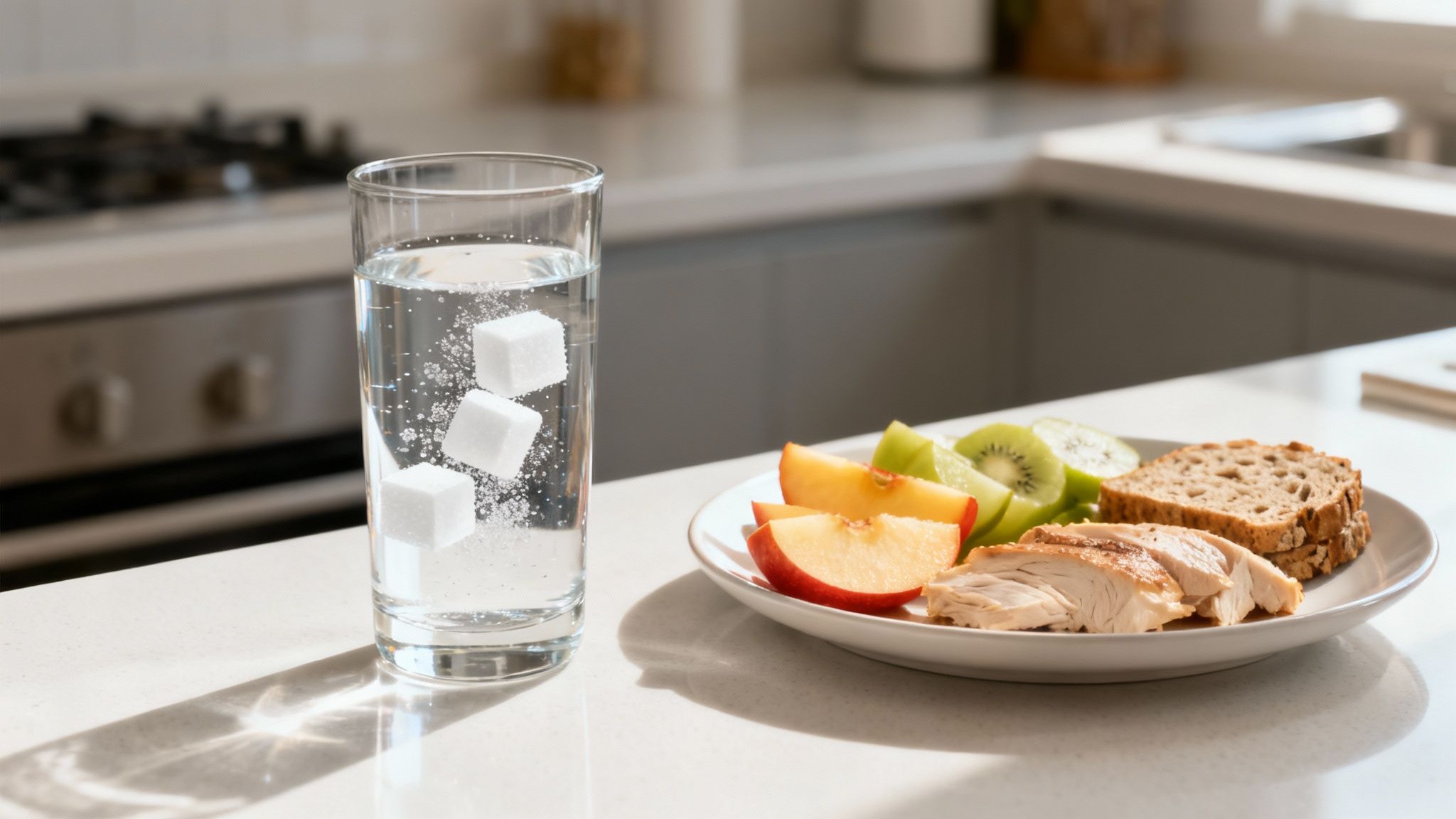
Since you can’t hit a fast-forward button on your liver, the best thing you can do is manage how you feel while your body does its work. This isn’t about finding a magic trick to get sober faster; it’s about supporting your system so the process is a little less miserable.
The goal is to feel more comfortable and take the edge off the harsh side effects while time, the only real cure, does its job. Simple, practical steps can make a world of difference.
Rehydrate the Right Way
Alcohol is a diuretic, a fancy term for something that makes you pee a lot. All those extra trips to the bathroom can lead to dehydration, which is the main culprit behind that pounding headache, dizziness, and overall fatigue.
Instead of chugging a huge bottle of water and feeling bloated, try sipping consistently. This gives your body a steady stream of hydration it can actually use.
To really help yourself out, add some electrolytes back into the mix. Your body loses crucial minerals like sodium and potassium when you’re dehydrated. You can replenish them easily with a few smart choices:
- Sports drinks or electrolyte powders (just try to find low-sugar options)
- Coconut water, which is a great natural source of potassium
- A simple snack, like a banana or a handful of pretzels
Rehydrating properly won’t budge your BAC, but it will directly tackle that headache and sluggishness. It’s the closest you’ll get to feeling human again while you wait.
Stabilize Your System with Food
Drinking, especially on an empty stomach, can send your blood sugar on a nosedive. That sudden drop is a big reason you might feel weak, shaky, and irritable. A good meal can help get those levels back to normal and give your body some much-needed fuel.
I know greasy comfort food sounds amazing right now, but it can be really tough on your stomach. A better bet is a balanced meal with some complex carbs, lean protein, and healthy fats. This combination provides sustained energy that won’t lead to another crash.
Key Takeaway: Think of food as a support crew, not a cure. It won’t sober you up, but it will help counteract some of alcohol’s worst physical effects by giving your body the nutrients it needs to fight back.
It’s no surprise that a 2019 survey found most people trying to “sober up” reach for water and a nap. These are fantastic for symptom relief, but they do nothing to lower your Blood Alcohol Concentration (BAC). Understanding this is crucial for managing your expectations and, more importantly, staying safe. You can find more facts about alcohol and your health from the World Health Organization.
Gentle Movement and Plenty of Rest
Now is not the time for a high-intensity workout. But some very light movement, like a slow walk outside, can sometimes help clear your head and get your blood flowing.
Honestly, though, the most powerful tool you have is rest.
Giving your body time to sleep or just relax lets it focus all its energy on one thing: getting the alcohol out of your system. This is the only way to truly get sober. By helping your body with hydration, food, and rest, you’re just making the waiting game a whole lot more bearable.
The Danger in Trying to “Sober Up Fast”
Trying to fool your body into sobering up isn’t just a waste of time—it can be downright dangerous. The real problem is the false sense of security it creates. When you slam a cup of coffee or jump into a cold shower, all you’re doing is masking the outward signs of being drunk. You’re not actually dealing with the alcohol in your system.
Your Blood Alcohol Concentration (BAC) is still high, even if you suddenly feel more awake and alert. This disconnect is what leads to terrible, often tragic, decisions.
The Illusion of Control
There’s a massive difference between feeling sober and being sober. When you try to force the process, you can easily trick yourself into thinking you’re fine to do things that are absolutely not safe, with driving being the most obvious and dangerous example.
You might feel steady enough to grab your keys, but your reaction time, judgment, and coordination are still shot. The jolt from caffeine can give you a burst of confidence, but it does absolutely nothing to improve your ability to react to a sudden stop sign or a pedestrian stepping into the road.
Key Takeaway: Every trick to “sober up fast” is a dangerous gamble. The only thing that truly matters is your BAC, and these so-called remedies don’t touch it.
This gap between how you feel and what your body is actually capable of is a major reason for alcohol-related accidents and injuries. The idea that you can somehow shortcut your body’s natural process is a myth we need to bust for good.
The Unseen Risk: Alcohol Poisoning
When you drink heavily and then start looking for a quick fix, you’re ignoring the very real threat of alcohol poisoning. Pushing your BAC into the toxic range can completely overwhelm your system, turning a bad night into a medical emergency.
The signs of alcohol poisoning can be easy to miss at first, but they escalate quickly. Be on the lookout for:
- Severe confusion or a stupor-like state
- Vomiting
- Breathing that’s slow or irregular
- Skin that looks pale or even bluish
- A drop in body temperature (hypothermia)
- Passing out and being impossible to wake up
Just trying to “walk it off” or “sleep it off” can be a fatal mistake if someone is experiencing alcohol poisoning. The global statistics are chilling: alcohol is responsible for around 3 million deaths every single year, which accounts for 5.3% of all deaths. Quick-fix sobriety tricks do nothing to lower a dangerously high BAC and can make a critical situation even worse. You can find more detailed alcohol abuse statistics from DrugAbuseStatistics.org.
Ultimately, the only truly safe approach is prevention and mindful drinking. Instead of looking for a cure after the fact, the real focus should always be on responsible consumption from the start. Your body needs one thing to sober up, and it’s the one thing you can’t rush: time.
A Proactive Plan for Safer Drinking
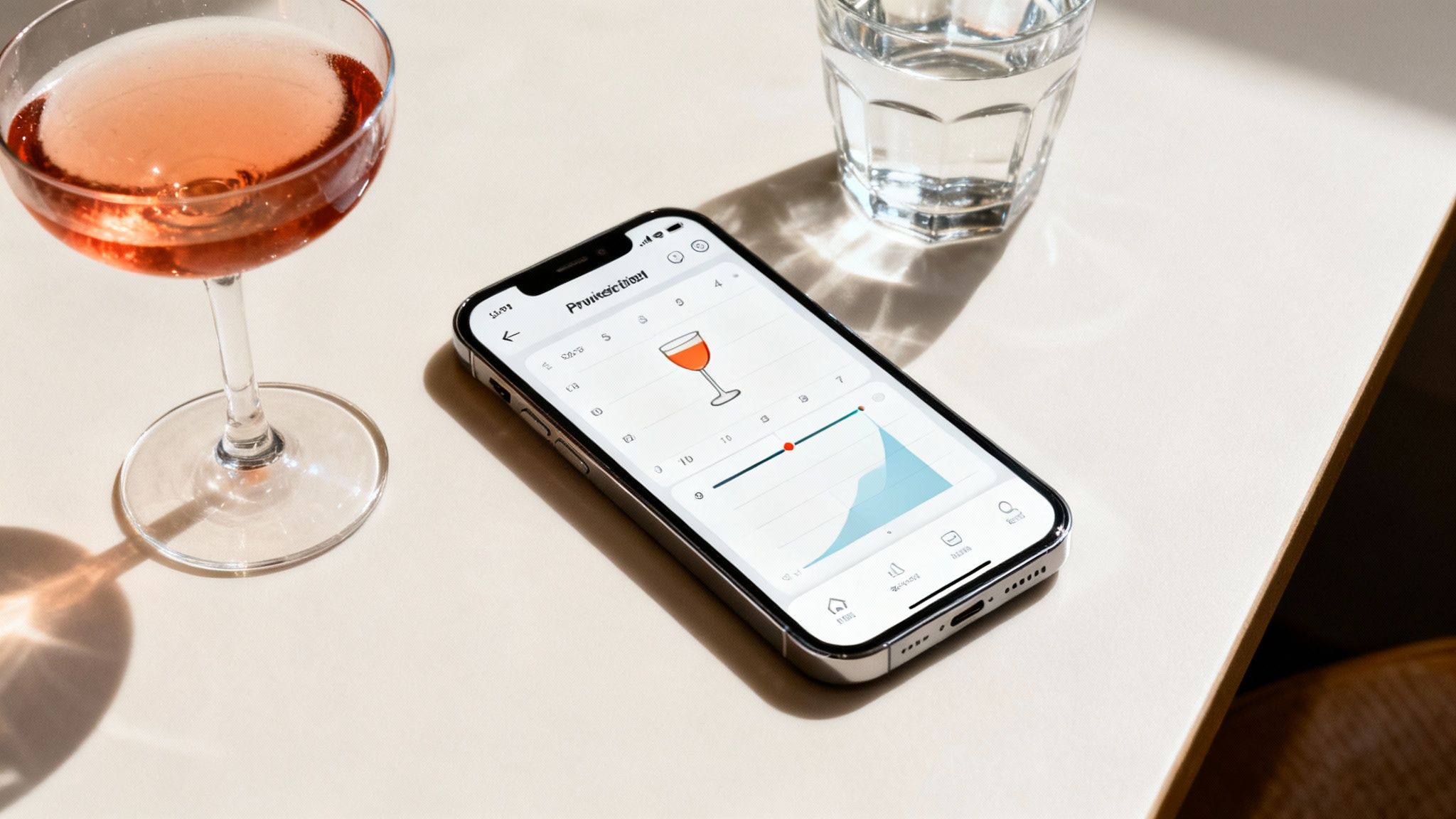
The best way to deal with intoxication? Avoid it altogether. Instead of frantically searching for ways to sober up after you’ve had too much, a proactive approach keeps you in the driver’s seat. This isn’t about skipping the fun; it’s about being smart so you can end the night on your own terms.
Thinking ahead is everything. The simple choices you make before taking that first sip can completely dictate how your evening unfolds. It’s about walking into a social event with a clear game plan, not just winging it and hoping for the best.
A little preparation makes all the difference. Setting some ground rules for yourself and figuring out the logistics beforehand takes the pressure off when you’re in the moment.
Set Your Limits Before You Go
One of the most effective things you can do is decide on your drink limit before you even leave the house. It’s far easier to stick to a number you chose with a clear head than to try making good decisions once alcohol has started to cloud your judgment.
Maybe your limit is two drinks for the whole night. Let a trusted friend who’s going with you know your plan. That small bit of accountability can be a game-changer. You can also use an app like Soberly to log your drinks, giving you a real-time visual of how you’re sticking to your goal.
Key Insight: Your future self will thank you for the boundaries your sober self sets. Planning isn’t about restriction; it’s an act of self-respect that empowers you to own your night.
This simple shift from a reactive to a proactive mindset is the foundation of drinking more responsibly. You’re making a conscious choice to look out for yourself.
Smart Strategies During the Event
Once you’re out, it’s time to put that plan into action. Pacing yourself is absolutely critical. A fantastic rule of thumb is to have a full glass of water between every alcoholic drink. This does two brilliant things: it keeps you hydrated (which your body will thank you for) and it naturally slows you down.
Also, pay close attention to what you’re drinking. Do you really know what a “standard drink” looks like? It’s not just the glass the bartender hands you. According to guidelines, a standard drink is:
- 12 ounces of regular beer (around 5% alcohol)
- 5 ounces of wine (around 12% alcohol)
- 1.5 ounces of distilled spirits (around 40% alcohol, like vodka or whiskey)
That craft IPA with 8% alcohol? Or that cocktail with a few different spirits mixed in? That’s way more than one standard drink. This is a super common trap people fall into. Knowing the real alcohol content in your glass helps you track your intake accurately and stay within the limit you set for yourself. Don’t let a heavy pour throw off your whole plan.
To make things even easier, here’s a simple checklist you can run through before you head out.
Your Safer Drinking Checklist
Going out should be about connecting with people and having a good time, not worrying about losing control. This checklist is designed to help you prepare, so you can focus on the fun part.
| Action Item | Why It’s Important | Example |
|---|---|---|
| Eat a Full Meal | Food, especially with fats and protein, slows alcohol absorption. | Have a balanced dinner like chicken and rice or a hearty pasta dish an hour before you go. |
| Set a Firm Drink Limit | A pre-set number is your guidepost for the night. | ”I’m only having two beers tonight, and that’s it.” |
| Tell a Friend Your Plan | Accountability makes you more likely to stick to your goals. | Text your friend: “Hey, just a heads up, I’m stopping at two drinks tonight. Keep me honest!” |
| Plan Your Hydration | Deciding to drink water in advance makes it a part of the plan, not an afterthought. | ”I’ll order a water with every drink and finish it before I think about getting another.” |
| Arrange a Safe Ride Home | This removes any temptation to drive after drinking, no matter what. | Pre-schedule an Uber or confirm you’re riding with a designated driver. |
By checking these boxes before you go, you’re setting yourself up for a successful and enjoyable night where you remain in control.
Common Questions About Sobering Up
Even with all the facts, you probably still have a few questions about how this all works in the real world. Let’s dig into some of the most common things people ask so you can make the safest, most informed choices for yourself.
Does Eating After Drinking Actually Help?
Here’s the deal: eating a big meal after you’re already drunk won’t magically lower your blood alcohol concentration (BAC). The alcohol is already in your system, and no amount of food can pull it back out.
What really makes a difference is eating a solid meal before you start drinking. Food in your stomach slows down the rate at which your body absorbs alcohol, which can lead to a lower peak BAC. Eating while you drink helps too, but its main job is to keep your blood sugar stable and provide nutrients—it won’t make your liver work any faster.
Can I Figure Out My Exact Sobering Time?
The short answer is no. While we use the “one drink per hour” rule as a general guideline, calculating your personal sobering timeline with any real accuracy is impossible. There are just too many factors that are unique to you.
Your body’s metabolism is a complex machine influenced by all sorts of things:
- Your weight and body composition
- Genetics and biological sex
- Whether you’ve eaten recently
- The overall health of your liver
Those online BAC calculators? They can give you a very rough estimate, but that’s it. They should never be used to decide if you’re okay to drive or do anything else that requires your full attention. The only surefire way to know you’re sober is to give your body plenty of time.
If there’s one piece of advice to take away, it’s this: always wait longer than you think you need to. It is always better to be overly cautious than to take a dangerous risk based on a guess.
Are There Any Pills That Speed Up Sobriety?
Absolutely not. Right now, there are no scientifically proven pills, supplements, or magic potions that can speed up how fast your liver metabolizes alcohol. Zero.
You’ll see plenty of products marketed for hangovers, and while they might make you feel a bit better by replacing electrolytes and vitamins, they do nothing to lower your BAC. Be very wary of anything that promises a quick sobriety fix. These claims are not backed by science and can give you a false sense of security, which is incredibly dangerous. Time is the only thing that works.
Ready to build a healthier relationship with alcohol and see your progress in real-time? Soberly gives you the tools to stay on track, celebrate your wins, and connect with a community that gets it. Take control of your journey today.